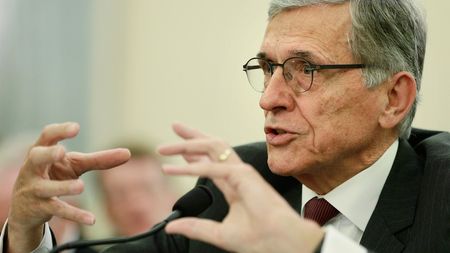Wheeler Makes It Official: It's Title II for ISPs
The smarter way to stay on top of the multichannel video marketplace. Sign up below.
You are now subscribed
Your newsletter sign-up was successful

FCC chairman Tom Wheeler has made official what he had already signaled for weeks. In an op ed in Wired Magazine online, Wheeler said Wednesday; "I am proposing that the FCC use its Title II authority to implement and enforce open Internet protections." The rules will apply to both wired and wireless broadband, a first for the commission.
He plans to circulate the draft of new network neutrality rules to the other commissioners Feb. 5.
"Using this authority, I am submitting to my colleagues the strongest open internet protections ever proposed by the FCC," Wheeler said. "These enforceable, bright-line rules will ban paid prioritization, and the blocking and throttling of lawful content and services. I propose to fully apply—for the first time ever—those bright-line rules to mobile broadband. My proposal assures the rights of internet users to go where they want, when they want, and the rights of innovators to introduce new products without asking anyone’s permission."
Wheeler insisted there would be no rate regulation under the new rules, "no tariffs, no last-mile unbundling," he added.
Wheeler said his proposal also includes " a general conduct rule" that he says "can be used to stop new and novel threats to the internet." He did not elaborate, but senior FCC officials suggested that would be a way to get at specialized services if they are functional equivalents of Internet access or attempts to evade the rules.
That general rule would not apply to potentially harmful conduct by edge providers however. An official said the rules are targeted where he said the problem was, with ISP connections to consumers--and interconnections if they have the effect of adversely impacting that connection.
For the first time, the FCC will apply Title II to interconnection, with a case-by-case model for enforcing complaints. The no-blocking or throttling or paid prioritization rules would not apply to interconnections between the networks and other services (like Netflix), but consumers and companies would be able to file complaints about congestion or paid peering and the FCC's Enforcement Bureau could investigate and take action.
The smarter way to stay on top of the multichannel video marketplace. Sign up below.
One agency official described the rules as using every tool in the toolbox, and a double-barrelled approach to protecting an open Internet.
Wheeler initially proposed using the FCC's Sec. 706 authority to set a commercially reasonable standard for for Internet openness, but said in the piece that he rethought that after deciding that, down the road, that standard could be interpreted to mean what was reasonable for "commercial interests," not consumers, and changed course.
It probably did not hurt that the President came out in support of Title II, though Wheeler has said he was rethinking the Sec. 706 approach before that, a point emphasized by officials.
Wheeler signaled that personal experience helped him decide to impose strong new rules based in the kind of Title II common carrier regs applied to phone service.
"I personally learned the importance of open networks the hard way. In the mid-1980s I was president of a startup, NABU: The Home Computer Network," he wrote. "My company was using new technology to deliver high-speed data to home computers over cable television lines. Across town Steve Case was starting what became AOL. NABU was delivering service at the then-blazing speed of 1.5 megabits per second—hundreds of times faster than Case’s company. “We used to worry about you a lot,” Case told me years later.
"But NABU went broke while AOL became very successful. Why that is highlights the fundamental problem with allowing networks to act as gatekeepers.
"While delivering better service, NABU had to depend on cable television operators granting access to their systems. Steve Case was not only a brilliant entrepreneur, but he also had access to an unlimited number of customers nationwide who only had to attach a modem to their phone line to receive his service. The phone network was open whereas the cable networks were closed. End of story."
Title II may just be the beginning of the legal story for the FCC. Telecoms, and likely cable operators this time around, too, have vowed to fight the move in court.
Contributing editor John Eggerton has been an editor and/or writer on media regulation, legislation and policy for over four decades, including covering the FCC, FTC, Congress, the major media trade associations, and the federal courts. In addition to Multichannel News and Broadcasting + Cable, his work has appeared in Radio World, TV Technology, TV Fax, This Week in Consumer Electronics, Variety and the Encyclopedia Britannica.

